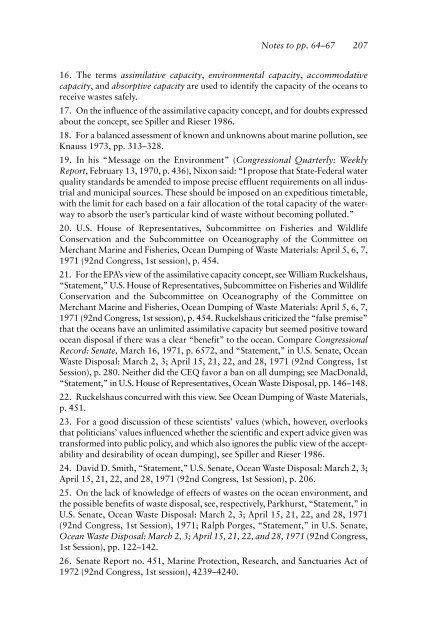Radioactive Waste Disposal at Sea: Public Ideas ... - IMO
Radioactive Waste Disposal at Sea: Public Ideas ... - IMO
Radioactive Waste Disposal at Sea: Public Ideas ... - IMO
Create successful ePaper yourself
Turn your PDF publications into a flip-book with our unique Google optimized e-Paper software.
Notes to pp. 64–67 207<br />
16. The terms assimil<strong>at</strong>ive capacity, environmental capacity, accommod<strong>at</strong>ive<br />
capacity, and absorptive capacity are used to identify the capacity of the oceans to<br />
receive wastes safely.<br />
17. On the influence of the assimil<strong>at</strong>ive capacity concept, and for doubts expressed<br />
about the concept, see Spiller and Rieser 1986.<br />
18. For a balanced assessment of known and unknowns about marine pollution, see<br />
Knauss 1973, pp. 313–328.<br />
19. In his “Message on the Environment” (Congressional Quarterly: Weekly<br />
Report, February 13, 1970, p. 436), Nixon said: “I propose th<strong>at</strong> St<strong>at</strong>e-Federal w<strong>at</strong>er<br />
quality standards be amended to impose precise effluent requirements on all industrial<br />
and municipal sources. These should be imposed on an expeditious timetable,<br />
with the limit for each based on a fair alloc<strong>at</strong>ion of the total capacity of the w<strong>at</strong>erway<br />
to absorb the user’s particular kind of waste without becoming polluted.”<br />
20. U.S. House of Represent<strong>at</strong>ives, Subcommittee on Fisheries and Wildlife<br />
Conserv<strong>at</strong>ion and the Subcommittee on Oceanography of the Committee on<br />
Merchant Marine and Fisheries, Ocean Dumping of <strong>Waste</strong> M<strong>at</strong>erials: April 5, 6, 7,<br />
1971 (92nd Congress, 1st session), p. 454.<br />
21. For the EPA’s view of the assimil<strong>at</strong>ive capacity concept, see William Ruckelshaus,<br />
“St<strong>at</strong>ement,” U.S. House of Represent<strong>at</strong>ives, Subcommittee on Fisheries and Wildlife<br />
Conserv<strong>at</strong>ion and the Subcommittee on Oceanography of the Committee on<br />
Merchant Marine and Fisheries, Ocean Dumping of <strong>Waste</strong> M<strong>at</strong>erials: April 5, 6, 7,<br />
1971 (92nd Congress, 1st session), p. 454. Ruckelshaus criticized the “false premise”<br />
th<strong>at</strong> the oceans have an unlimited assimil<strong>at</strong>ive capacity but seemed positive toward<br />
ocean disposal if there was a clear “benefit” to the ocean. Compare Congressional<br />
Record: Sen<strong>at</strong>e, March 16, 1971, p. 6572, and “St<strong>at</strong>ement,” in U.S. Sen<strong>at</strong>e, Ocean<br />
<strong>Waste</strong> <strong>Disposal</strong>: March 2, 3; April 15, 21, 22, and 28, 1971 (92nd Congress, 1st<br />
Session), p. 280. Neither did the CEQ favor a ban on all dumping; see MacDonald,<br />
“St<strong>at</strong>ement,” in U.S. House of Represent<strong>at</strong>ives, Ocean <strong>Waste</strong> <strong>Disposal</strong>, pp. 146–148.<br />
22. Ruckelshaus concurred with this view. See Ocean Dumping of <strong>Waste</strong> M<strong>at</strong>erials,<br />
p. 451.<br />
23. For a good discussion of these scientists’ values (which, however, overlooks<br />
th<strong>at</strong> politicians’ values influenced whether the scientific and expert advice given was<br />
transformed into public policy, and which also ignores the public view of the acceptability<br />
and desirability of ocean dumping), see Spiller and Rieser 1986.<br />
24. David D. Smith, “St<strong>at</strong>ement,” U.S. Sen<strong>at</strong>e, Ocean <strong>Waste</strong> <strong>Disposal</strong>: March 2, 3;<br />
April 15, 21, 22, and 28, 1971 (92nd Congress, 1st Session), p. 206.<br />
25. On the lack of knowledge of effects of wastes on the ocean environment, and<br />
the possible benefits of waste disposal, see, respectively, Parkhurst, “St<strong>at</strong>ement,” in<br />
U.S. Sen<strong>at</strong>e, Ocean <strong>Waste</strong> <strong>Disposal</strong>: March 2, 3; April 15, 21, 22, and 28, 1971<br />
(92nd Congress, 1st Session), 1971; Ralph Porges, “St<strong>at</strong>ement,” in U.S. Sen<strong>at</strong>e,<br />
Ocean <strong>Waste</strong> <strong>Disposal</strong>: March 2, 3; April 15, 21, 22, and 28, 1971 (92nd Congress,<br />
1st Session), pp. 122–142.<br />
26. Sen<strong>at</strong>e Report no. 451, Marine Protection, Research, and Sanctuaries Act of<br />
1972 (92nd Congress, 1st session), 4239–4240.

















